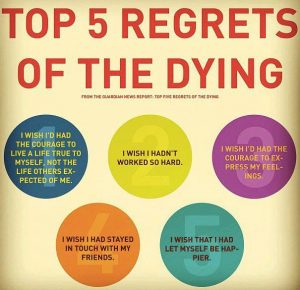One of the biggest traps we face as we make decisions about life and work is the trap of conforming to societal expectations or conventional paths instead of blazing our own path in life. Call it the conformity trap.
Conformity entails behaving in ways similar to others or according to their wishes, instead of relying on our own judgment or preferences. We see this all time. We tend to mirror the body language and communication styles of our peer groups.
Our penchant for conformity comes from a strong desire to fit in with the group. It can be conscious or unconscious, and it doesn’t require overt pressure. The pressures can be indirect and subtle yet still powerful (or even misperceived—manufactured by our anxious brains).
As humans, we feel a strong, almost primal need for acceptance. We want others to view us favorably. It’s a powerful urge baked into our biology, presumably because we found safety in the group that helped us survive despite all the risks we’ve faced over the ages, most of which are more pronounced and dangerous when we’re alone.
Willing to Go Along
To see how powerful the effects of the conformity trap are, consider the classic experiment by Dr. Solomon Asch, a Polish social psychology researcher, who gave people cards with lines of different lengths on them and had them judge which line was the same length as the target line. When researchers tested people individually, the success rate was of course near perfect (99%). It was a no-brainer. People could see the lines right in front of them with their own eyes.
But when people were tested in a group setting and there were secret people planted in the experimental group who were instructed by the researchers to give wrong answers, it caused many subjects of the experiment to ignore what they saw with their own eyes.
Overall, they agreed with the wrong answer from the majority about the length of the lines a whopping 37% of the time. So the error rate went from 1% to 37% on a simple and obvious task due to group influences. The point is not about faulty vision. Rather, they were willing to go along with something they clearly knew wasn’t right. Why? To remain accepted and in agreement with the group.
Excellent Sheep
“They’re anxious, timid, and lost… heading meekly in the same direction, great at what they’re doing but with no idea why they’re doing it. They’re violently averse to risk as a product of being shackled by their academic success.” -William Deresiewicz
In his book, Excellent Sheep, teacher and author William Deresiewicz describes how this problem shows up in elite universities. He heard the term “excellent sheep” from one of his students. It describes a phenomenon in which students “feel toxic levels of fear, anxiety, and depression,” are in a “constant state of competition,” feel a need for “compulsive overachievement,” go through “endless hoop-jumping,” and are loaded up with schoolwork and extracurriculars and stressed out and miserable most of the time.
The result: a stunning amount of them end up going into the same well paying, high-status, professional careers, dutifully following the herd and the wishes of their shepherds. Yes, problems of privilege, but still problems.
Consider the response of a former student of mine when asked in a survey about the top challenges faced:
“We feel the pressure of achieving high grades in school, having a job, doing extracurricular work such as volunteering to build up a CV, having a social life, and exercise—all at the same time. Social media makes it seem as if everyone is totally capable of juggling twenty balls at once, emphasizing only positive experiences. Nowadays, the only thing that is important is ‘measurable’ success. Anything you cannot put on your CV or on social media doesn’t count anymore…. Because of all these measurements, I feel like I am only extrinsically motivated. And I don’t want that. I want to be intrinsically motivated and block out everything that others or society expect of me—but do the things that I want to do because I value them.”
The Problem with the Conformity Trap
“Most people are controlled by fear of what other people think. And fear of what, usually, their parents or their relatives are going to say about what they’re doing. A lot of people go through life like this, and they’re miserable. You want to be able to do what you want to do in life.” –Janet Wojcicki, professor, University of California at San Francisco
The problem is that this conformity urge can interfere with our ability to make good decisions—decisions that keep us safe or that leave our character intact.
Bronnie Ware identified the “top regrets of the dying” after years of work as a palliative nurse caring for people in the final weeks and days of their lives. The top regret she noted was this:
“I wish I’d had the courage to live a life true to myself, not the life others expected of me.”
These pressure patterns of the conformity trap start early and continue with great momentum throughout our lives. Common examples during adolescence include pressure to do the following to fit in:
- bullying, racist, or sexist behavior (going along with it or looking the other way)
- casual sex
- alcohol or drugs
- ditching school or vandalism
- cheating and cutting corners (according to researchers, we’re more likely to engage in unethical behavior when we see others succeed at it)
- feeling that our parents will only be satisfied if we do what they want us to do, regardless of what we want, and following their preferences toward safer and more lucrative and prestigious careers (note also that they may have felt similar pressures from their parents, and so on, in some sort of endless family loop; making things worse, we’re conflicted because we love our parents and don’t want to disappoint them but we also want to find our own path in life).
Consider this message from another former student:
“I am facing a few obstacles at the moment, and most of them are related to what is expected of me, especially by my family. I have always been a very good student at school, I got the highest grades throughout high school, I was valedictorian at my graduation, I got into a top university for my bachelor’s degree and my master’s, and I have been working full-time and part-time during my studies as well. I’ve always heard from everyone around me that I would make a great businesswoman, that I would get in to ‘any of the top companies’ I wanted. And now that I’m at that point, I don’t know if that’s the type of success that will make me the happiest…. So at the moment, my major obstacle is internal; do I risk disappointing them for not following the path they would expect me to? Or do I accept the fact that I might end up working somewhere that is not a true ‘fit’ for me to make others happy?… Another obstacle I have is internal; I don’t want to fail. And I am terrified of failing. And this fear of failure is putting limits to what I will allow myself to do…. I am scared of taking a step in the wrong direction.”
When we conform, we can lose our individuality and uniqueness. What’s more, we feel anxiety about having to maintain an image of near perfection.
It’s important to note that conformity is not all bad. We evolved with a desire for it for good reasons, and there are some benefits of it.
For example, it can make our lives simpler and easier because we don’t have to worry as much about harsh judgment from our peers. It also gives us something of a safety net we can fall into when we’re anxious.
The Second-Order Effect of the Conformity Trap
Here’s the problem. We move through different social circles during our lives: from childhood and teen friends to early-career colleagues and neighbors, to new people we meet at work or in new places we live or visit, including our spouse or partner’s friends.
Sometimes we make decisions about work to impress certain people and fit in, but we won’t even be in touch with those people in a few years. As we age, we’re shocked by how little it matters what some of those people think, when back in those early days it felt like the weight of the world upon us. And yet we make big decisions that are hard to change based on those often superficial and unhelpful influences.
The effects of conformity can be long-lasting and hard to unwind, given the switching costs of trying to make big changes later (like a change in career or college major).
What to Do about the Conformity Trap
So the forces of conformity are powerful and hard to resist. What to do about it? Here are a half-dozen tips:
First, know yourself. That begins with knowing your story—and weaving it into a cohesive narrative based on the patterns you’ve seen in your life and especially drawing on your sense of purpose, values, strengths, passions, and aspirations. It also means learning from challenges, setbacks, and tragedies but not letting yourself be defined or limited by them.
Second, embrace your uniqueness as part of your identity. That way, you can explain your nonconformity with the group using your difference in a way that fits with your core identity—with who you really are.
Third, build up your courage—the courage you’ll need to resist the Siren call of conformity. How? By practicing hard things. By doing what you think you can’t. Start with something small. See how often it turns out that fears were phantoms, and that the worst cases imagined almost never materialize. And how resilient and resourceful we can be when we need to be. As we develop an increasing ability to withstand criticism and fight against the pressures of conformity, our confidence increases and we develop a clearer sense of our identity and uniqueness. It can turbocharge our life and work.
Fourth, find support from people who value you for your uniqueness and differences—and who don’t pressure you to fit into to conventional boxes. (And be sure to reciprocate.)
Fifth, stop spending time with people who put you in uncomfortable situations. Terminate the toxic in your life.
Sixth, and most importantly, JUST BE YOU. Stop following the crowd and blaze your own path in life. It may make the difference between a lifetime of fulfillment versus regret.
Reflection Questions
- Are you falling into the conformity trap in areas of your life? If so, which ones?
- How is it hurting you or holding you back?
- What will you do about it, starting now?
Tools for You
- Quality of Life Assessment so you can discover your strongest areas and the areas that need work, then act accordingly.
- Traps Test (Common Traps of Living) to help you identify what’s getting in the way of your happiness and quality of life
- Personal Values Exercise to help you clarify what’s most important to you
- Leadership Derailers Assessment to help you identify what’s inhibiting your leadership effectiveness
More Articles in this Series on the Common Traps of Living
- Breaking the “Trance of Unworthiness”
- Getting Good at Overcoming Fear
- Burnout and the Great Resignation
- Beware the Disease of More
- Golden Handcuffs—Stuck in a Job You Don’t Like?
- Are You Trapped by Success?
- Is Your Identity Wrapped Up Too Much in Your Work
- The Mental Prisons We Build for Ourselves
- Do You Have Margin in Your Life?
- The Trap of Deferring Dreams and Postponing Happiness
- The Trap of Caring Too Much about What Other People Think
- Tired of Settling? How to Light Your Life and Work on Fire
- The Problem of Going It Alone
- Feeling Behind? It May Be a Trap
- Choice Overload and Career Transitions
- The Comparison Trap
- Are You Drifting through Life?
- Guard Your Heart
- Are You Playing the Long Game?
- Time to Check the Path You’re On?
Postscript: Inspirations on Avoiding the Conformity Trap
- “Our deepest calling is to grow into our authentic selfhood, whether or not it conforms to some image of who we ought to be.” -Parker Palmer
- “There is nothing more genuine than breaking away from the chorus to learn the sound of your own voice.” -Po Bronson
- “But there is something that’s a great deal more important than parental approval: learning to do without it. That’s what it means to become an adult…. You won’t be able to recognize the things you really care about until you have released your grip on all the things that you’ve been taught to care about.” -William Deresiewicz, Excellent Sheep
- “To know what you prefer instead of humbly saying Amen to what the world tells you you ought to prefer, is to have kept your soul alive.” -Robert Louis Stevenson
- “No one can build you the bridge on which you, and only you, must cross the river of life. There may be countless trails and bridges and demigods who would gladly carry you across; but only at the price of pawning and forgoing yourself.” -Friedrich Nietzsche
- “Middle-status conformity leads us to choose the safety of the tried-and-true over the danger of the original.” -Adam Grant in his book, Originals: How Non-Conformists Move the World
- “Any day of the week I would choose to be ‘out’ with others and in touch with myself… than to be ‘in’ with others and out of touch with myself.” -Portia Nelson
- “Every time you don’t follow your inner guidance, you feel a loss of energy, loss of power, a sense of spiritual deadness.” -Shakti Gawain
- “Cowardice asks the question ‘Is it safe?’ Consensus asks the question ‘Is it popular?’ But conscience asks, ‘Is it right?’” And there comes a time when one must take a position that is neither safe, nor politic, nor popular… but because conscience tells one it is right.” -Martin Luther King, Jr.
++++++++++++++++++++++++++++++
Gregg Vanourek is a writer, teacher, TEDx speaker, and coach on leadership and personal development. He is co-author of three books, including LIFE Entrepreneurs: Ordinary People Creating Extraordinary Lives (a manifesto for integrating our life and work with purpose, passion, and contribution) and Triple Crown Leadership: Building Excellent, Ethical, and Enduring Organizations (a winner of the International Book Awards). Check out his Best Articles or get his monthly newsletter. If you found value in this article, please forward it to a friend. Every little bit helps!







